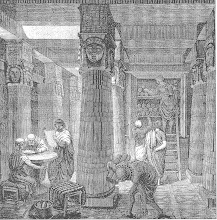4/23/2011
3/11/2010
yay!
11/06/2009
The end of a journey

cartoon from cartoonchurch.com
9/12/2009
Videos!
The idea that videos of the Library of Alexandria might exist never crossed my mind till late. I surfed the net for pictures thinking that as it is a historical library, I might be lucky just to find some pictures. This shows how ignorant I was of the resources available on the web and how I was NOT "thinking out of the box". With a gentle reminder from Linda (my teacher), I unearthed a whole program on The Library of Alexandria from YouTube that was broadcast on the History Channel. This gave a whole new perspective to my topic, because now my readers and I can actually see the details described in the contents. The videos show the great library, although much in ruin, has evidence of past glory.
9/08/2009
- MacLeod, R 2002, The library of Alexandria : centre of learning in the ancient world, I. B. Tauris, London
- Casson, L 2001, Libraries in the ancient world, Yale University Press, New Haven
- Trumble, K 2003, The Library of Alexandria, Clarion Books, New York
- Wikimedia Foundation Inc. 2009, Library of Alexandria, viewed 25 August 2009.
http://en.wikipedia.org/wiki/Library_of_Alexandria - Brundige, E 1991, The decline of the library and museum of Alexandria, viewed 01 September 2009.http://www.digital-brilliance.com/kab/alex.htm
- Bibliotheca Alexandrina 2009, Bibliotheca Alexandrina, viewed 01 September 2009
http://www.bibalex.org/English/index.aspx - YouTube 2009, Library of Alexandria, viewed 13 September 2009. http://www.youtube.com/results?search_query=library+of+alexandria&search_type=&aq=0&oq=library+of+al
8/28/2009
Editing!!
8/26/2009
The Rise and the Fall of the Library of Alexandria
 Artist's impression of the main hall of the Museum of Alexandria. The wall portraits show Alexander the Great (left) and Serapis (right). Source: Carl Sagan's Cosmos television program (1980)
Artist's impression of the main hall of the Museum of Alexandria. The wall portraits show Alexander the Great (left) and Serapis (right). Source: Carl Sagan's Cosmos television program (1980)- Aristarchus, the first to state that the Earth revolves around the Sun, a full 1800 years before Copernicus.
- Eratosthenes proved that the Earth was spherical and calculated its circumference with amazing accuracy, 1700 years before Columbus sailed on his epic voyage.
- Callimachus, the poet, described the scrolls in the Library organized by subject and author, becoming the Father of Library Science.
- Euclid wrote his elements of geometry, the basic text studied in schools all over the world to this day.
- Herophilus identified the brain as the controlling organ of the body and launched a new era of medicine.
- The Septuagint, the first translation of the Old Testament from Hebrew into Greek, was created.
- Manetho chronicled the pharaohs and organized our history into the dynasties we use to this day.
Destruction of the Library
No single disaster destroyed the library and its collections but a series of mishaps put an end to the greates library of the ancient world. Ancient and modern sources identify four possible occasions for the destruction of the Library of Alexandria:
In 48 B. C. E during Julius Caesar’s Alexandrian war, a fire destroyed 400,000 rolls in the Royal Library. It is also in legend that an Arab general “Amr ibn-al Aas” invaded Egypt in the 7th Century. He destroyed all the books in the Alexandrian Library collection that disagreed with the Koran. It is said that four thousand bath houses in Alexandria were heated for six months with the great library as fuel.
Also, neglect is as sure a destroyer of libraries as arson. It is indeterminable how many of the rolls of the library were eaten by mice, rotted by damp or stolen during the course of time
It is also quite likely that even if the Museum was destroyed with the main library the outlying "daughter" library at the Temple of Serapis continued on. Many writers seem to equate the Library of Alexandria with the Library of Serapis although technically they were in two different parts of the city. The tragedy of course is not the uncertainty of knowing who to blame for the Library's destruction but that so much of ancient history, literature and learning was lost forever.
